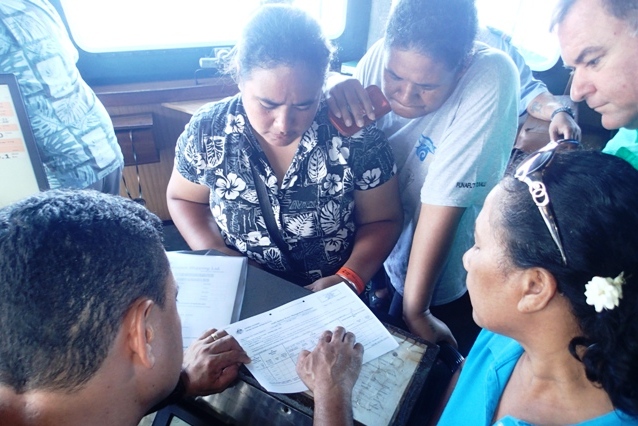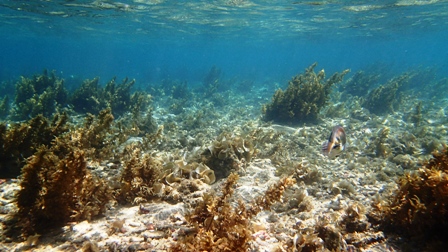
Island and Ocean Ecosystems
The nine islands of Tuvalu have joined forces with the rest of the Pacific islands to fight invasive species to protect their environment, communities and economic aspirations.
A three day workshop coordinated by the Secretariat of the Pacific Regional Environment Programme (SPREP) led to the formation of the Tuvalu Invasive Species Committee which will be coordinated by the Environment Department.
 Inspecting ship logs as part of training to manage the spread of invasive species through ballast water
Inspecting ship logs as part of training to manage the spread of invasive species through ballast water
Photo SPREP/Posa.S
"A key outcome in forming this Committee is that stakeholders and various agencies have agreed to collaborate which can bring about positive outcomes," said Dr. Posa Skelton, Coordinator of the Pacific Invasives Learning Network at SPREP.
A busy schedule is anticipated for this new committee consisting of representatives from key government agencies, private sector, local communities and civil society.
During the workshop participants learnt the water carried by a ship to help keep it stable during a voyage, also known as ballast water, can have thousands of living organisms swimming in it.
When ships become close to their destination some of the water is discharged to allow the ship to take on cargo. It becomes a problem if this discharged water contains living organisms which then survive and spread.
People living in Funafuti have recently noticed brown seaweed that is spreading throughout their island.
"This brown seaweed, Sargassum, is something that is new for us here in Tuvalu", says Mr. Mataio Tekinene, director for the environment department and the coordinator for the newly formed Tuvalu invasive species committee.

"We worry that it will spread to outer islands and cause problems for our communities."
Ballast water is one of the many avenues that can introduce invasive species into a country.
"Invasive species are a global problem and one that SPREP and its member countries consider a high priority. Tuvalu sees this as a priority and was one of the first few countries that signed up to the international convention for managing ballast water," said Mr Anthony Talouli, SPREP's Marine Pollution Advisor.
"The workshop discussed the Ballast Water Convention and what Tuvalu's obligations and expectations are when it comes into force. Tuvalu needs to develop its legislation and policies as part of its obligations to the convention."
The importance of understanding the convention and how this relates to protecting the marine environment was discussed by the participants.
"Before I came to the workshop, I didn't really understand what ballast water was and how it can be a problem for us here in Tuvalu", said Ms. Vasa Tuisiga an officer from the Marine Department.
"After the workshop, I now know how these invasive species are transported by ballast water. So we need to make sure that ships don't come and let the water out in our lagoon or we may have invasive species."
Tuvalu's capacity to deal with this issue requires much assistance, and working with neighbouring countries was seen as one of the opportunities that it can explore.
If countries develop procedures and guidelines that are common and shared throughout the Pacific, this will help the shipping industry conform to the requirements. So ships coming from Fiji are expected to follow the same procedures before they enter Tuvalu in relations to how they manage their ballast water.
The international community is working together to manage this problem, but at the end of the day, how this is implemented at both the national and local levels is what matters.
This highlighted the importance of having skilled officers that are certified to carry out the task.
Officers, especially on small islands, will need to understand the technical aspects of ballast water management but they also need to uphold social and cultural values for the protection of communities and their environment.
Tuvalu has experienced significant invasive species outbreaks including the yellow crazy ant that are now established on Funafuti and surrounding islets, making their way throughout the outer islands.
"Communities in Nukulaelae are reporting to us of coconut and land crabs being killed by these new yellow crazy ants," said Mr. Tekinene.
"These incidents are devastating and we feel helpless as we don't have the resources and manpower to be rid of them. It wasn't long ago that our kanava trees were stripped bare by a moth that was likely to have been introduced from neighbouring countries," adds Mataio.
The workshop was held in Tuvalu from 5 – 7 August. It was supported by the International Maritime Organisation and the Australian Maritime and Safety Authority. This workshop is part of the work funded through the Noumea Convention - for the protection of marine natural resources and environment of the Pacific Islands.
For further information:
Mr Anthony Talouli, Marine Pollution Advisor, SPREP - [email protected]
Posa Skelton, PILN Coordinator, SPREP - [email protected]
A three day workshop coordinated by the Secretariat of the Pacific Regional Environment Programme (SPREP) led to the formation of the Tuvalu Invasive Species Committee which will be coordinated by the Environment Department.
 Inspecting ship logs as part of training to manage the spread of invasive species through ballast water
Inspecting ship logs as part of training to manage the spread of invasive species through ballast water Photo SPREP/Posa.S
A busy schedule is anticipated for this new committee consisting of representatives from key government agencies, private sector, local communities and civil society.
During the workshop participants learnt the water carried by a ship to help keep it stable during a voyage, also known as ballast water, can have thousands of living organisms swimming in it.
When ships become close to their destination some of the water is discharged to allow the ship to take on cargo. It becomes a problem if this discharged water contains living organisms which then survive and spread.
People living in Funafuti have recently noticed brown seaweed that is spreading throughout their island.
"This brown seaweed, Sargassum, is something that is new for us here in Tuvalu", says Mr. Mataio Tekinene, director for the environment department and the coordinator for the newly formed Tuvalu invasive species committee.

Sargassum polycystum photo courtesy of Dr Posa Skelton
"We worry that it will spread to outer islands and cause problems for our communities."
Ballast water is one of the many avenues that can introduce invasive species into a country.
"Invasive species are a global problem and one that SPREP and its member countries consider a high priority. Tuvalu sees this as a priority and was one of the first few countries that signed up to the international convention for managing ballast water," said Mr Anthony Talouli, SPREP's Marine Pollution Advisor.
"The workshop discussed the Ballast Water Convention and what Tuvalu's obligations and expectations are when it comes into force. Tuvalu needs to develop its legislation and policies as part of its obligations to the convention."
The importance of understanding the convention and how this relates to protecting the marine environment was discussed by the participants.
"Before I came to the workshop, I didn't really understand what ballast water was and how it can be a problem for us here in Tuvalu", said Ms. Vasa Tuisiga an officer from the Marine Department.
"After the workshop, I now know how these invasive species are transported by ballast water. So we need to make sure that ships don't come and let the water out in our lagoon or we may have invasive species."
Tuvalu's capacity to deal with this issue requires much assistance, and working with neighbouring countries was seen as one of the opportunities that it can explore.
If countries develop procedures and guidelines that are common and shared throughout the Pacific, this will help the shipping industry conform to the requirements. So ships coming from Fiji are expected to follow the same procedures before they enter Tuvalu in relations to how they manage their ballast water.
The international community is working together to manage this problem, but at the end of the day, how this is implemented at both the national and local levels is what matters.
This highlighted the importance of having skilled officers that are certified to carry out the task.
Officers, especially on small islands, will need to understand the technical aspects of ballast water management but they also need to uphold social and cultural values for the protection of communities and their environment.
Tuvalu has experienced significant invasive species outbreaks including the yellow crazy ant that are now established on Funafuti and surrounding islets, making their way throughout the outer islands.
"Communities in Nukulaelae are reporting to us of coconut and land crabs being killed by these new yellow crazy ants," said Mr. Tekinene.
"These incidents are devastating and we feel helpless as we don't have the resources and manpower to be rid of them. It wasn't long ago that our kanava trees were stripped bare by a moth that was likely to have been introduced from neighbouring countries," adds Mataio.
The workshop was held in Tuvalu from 5 – 7 August. It was supported by the International Maritime Organisation and the Australian Maritime and Safety Authority. This workshop is part of the work funded through the Noumea Convention - for the protection of marine natural resources and environment of the Pacific Islands.
For further information:
Mr Anthony Talouli, Marine Pollution Advisor, SPREP - [email protected]
Posa Skelton, PILN Coordinator, SPREP - [email protected]